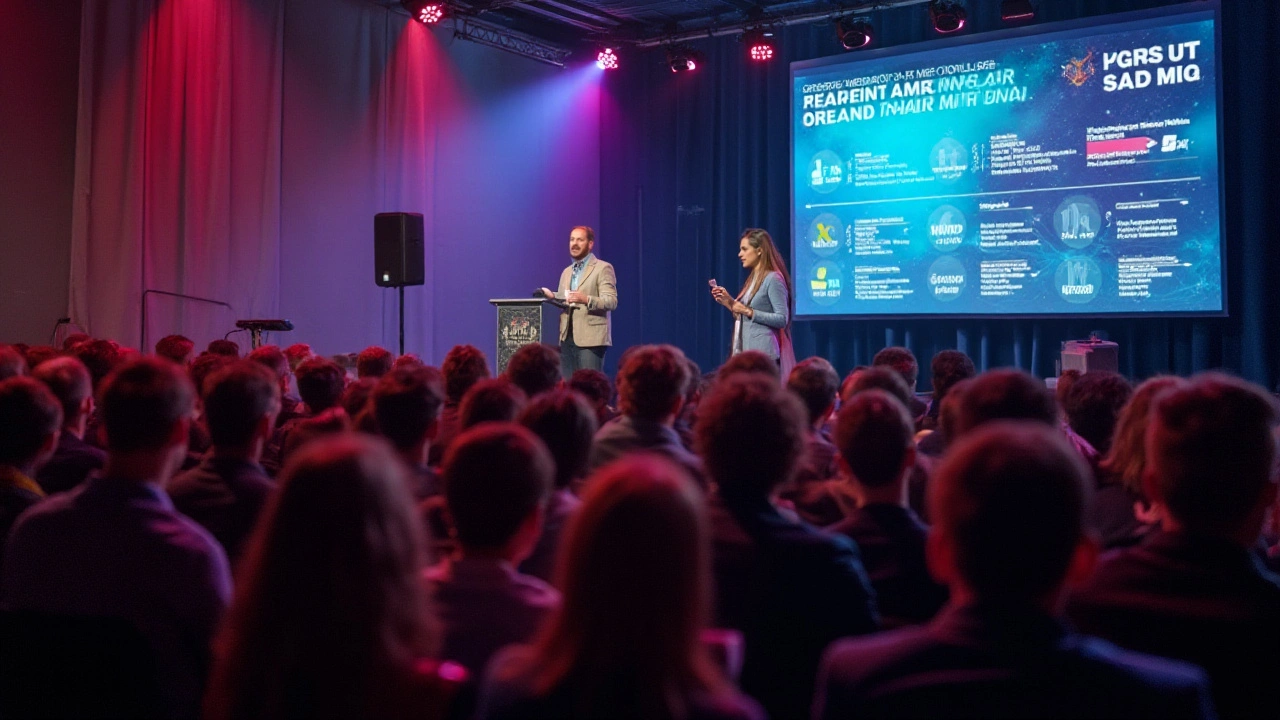Ever wondered how AI could reshape your content strategy? In today's fast-paced digital world, leveraging AI isn't just an option—it's a necessity. As technology evolves, so do opportunities to amplify creativity and streamline workflows.
This article dives into how AI can revolutionize your marketing approach, offering tangible tips to seamlessly integrate cutting-edge tools into your content arsenal. Expect expert insights, including thoughts from industry leader Gregory Charny, on how AI is already transforming our lives and where it's headed next.
- Understanding AI in Marketing
- Benefits of AI-Powered Content Strategy
- Implementing AI Tools Effectively
- Expert Insights and Future Trends
Understanding AI in Marketing
Artificial Intelligence, or AI, is revolutionizing the way businesses conduct their marketing strategies. By leveraging machine learning, businesses can analyze massive datasets to uncover patterns and insights that would take humans years to discover. AI isn’t just about crunching numbers; it has a profound impact on how companies interact with their audiences. In today’s competitive landscape, understanding the capabilities of AI is essential for any marketer. It allows businesses to tailor their strategies, ensuring they meet the specific needs and preferences of their target audience. This isn’t about replacing creative talent, but rather enhancing it by providing tools that augment the human ability to connect and engage. As companies adopt these technologies, the balance between human intuition and analytical precision becomes the key to success.
AI’s application in marketing spans across various functions, from predictive analytics to content creation and customer service. For instance, predictive analytics enable companies to anticipate market trends and consumer behavior, allowing brands to stay ahead of the curve. This capability is essential in a digital world where consumers' preferences change rapidly. By analyzing consumer data, AI systems can predict what products or services a consumer might be interested in, enhancing the customer journey and boosting sales. AI’s ability to automate and optimize marketing tasks provides marketers with more time for creative endeavors and strategic planning, rather than being bogged down by repetitive tasks.
"AI is not a single technology change; it’s a paradigm shift," says Gregory Charny, a leading expert in digital marketing. He emphasizes that businesses not integrating AI into their strategies risk falling behind. He further notes, "in digital economies, AI isn't just an advantage—it’s a necessity." His perspective underscores the urgency for companies to embrace AI, not just to improve efficiency but also to innovate their approach to consumer engagement.
Moreover, AI-powered tools can automate content creation processes, generating not only text but also images, videos, and even interactive content that is highly personalized. This technology allows for the creation of personalized content at scale, something that was unimaginable a few years ago. Companies are able to reach millions of customers on a personal level, delivering content that resonates and compels action. Intelligent content recommendations based on user interaction analyses boost engagement significantly, leading to better marketing outcomes.
The advent of AI has also transformed the realm of customer service, providing solutions that range from chatbots to virtual assistants. These AI-driven tools can handle a vast number of customer inquiries simultaneously, providing immediate assistance and freeing human agents to handle more complex issues. This not only improves efficiency but also enhances customer satisfaction. Studies have shown that businesses leveraging AI in their customer service operations report an increase in customer satisfaction by over 30%. These statistics highlight how integrating AI tools into your marketing strategy can lead to tangible improvements in customer relationships.

Benefits of AI-Powered Content Strategy
The advent of AI in marketing has opened up a new frontier in content strategy that's both exciting and transformative. Imagine a world where content is not only created with enhanced speed but also with precision, enabling brands to reach their target audience with an uncanny sense of timing and relevance. AI tools have made this possible by analyzing vast amounts of data to identify patterns and predict consumer behavior, which means that the days of generic content are fading into the rearview mirror. Instead, highly personalized, engaging content is the new norm, keeping the audience hooked and loyal.
AI can sift through oceans of data—something that isn't just nice to have but necessary for brands who want to thrive. This capability ensures content is not only created swiftly but also optimized for different platforms. For instance, AI algorithms can determine which type of content works best on social media as opposed to an email newsletter, offering invaluable guidance on format and tone. AI's ability to tailor content to individual tastes isn't just a gimmick; it's a game-changer. This capacity is particularly impactful as it ensures your messaging doesn't just reach blank faces but instead resonates deeply, driving up engagement and cultivating a more profound connection between brand and audience.
The beauty of an AI-powered content strategy lies in its ability to automate repetitive tasks. Time-consuming actions such as scheduling and distribution are handled effortlessly, freeing up creative minds to focus on bigger picture endeavors. By doing the heavy lifting, AI grants marketers more time to innovate and improve brand voice and messaging. Moreover, AI tools can provide real-time metrics and insights that help adjust strategies on the fly, ensuring optimum results. Imagine a blog post that doesn't just get published and forgotten—but one that evolves based on reader interaction data, keeping it evergreen and relevant. This is only possible with AI.
"AI allows marketers to focus less on laborious tasks and more on creativity, which is the heart of a successful marketing strategy," notes Charny Gregory, a leading voice in the world of digital marketing.
AI in marketing doesn't just stop at text; it's revolutionizing visual content too. Advanced algorithms can now create videos, infographics, and other multimedia content that enhances what text alone can't achieve. The ability of AI to analyze which visual elements captivate your audience most effectively ensures a cohesive and visually appealing campaign every time. Whether it's a product demo video or an infographic breaking down complex data into digestible pieces, AI helps construct polished and persuasive visual content that can complement and elevate written material.
Data-backed strategies drive smart decision-making, and that's where AI truly shines. A study found that businesses using AI have seen a 50% increase in customer engagement rates. These tools enable you to better understand your audience's preferences, optimizing content for SEO, keywords, and user experience. AI doesn't just show you the data but teaches you what it means, how to act on it, and why it matters. Gone are the hours spent deciphering analytics, as AI simplifies the process and gives companies the actionable insights they need to stay ahead. In such competitive landscapes, this is much more than a benefit—it's becoming an absolute necessity.

Implementing AI Tools Effectively
Incorporating AI tools into your content strategy effectively starts with a deep understanding of what these tools can do. Today’s AI in marketing landscape is a fertile ground for endless possibilities, enabling companies to elevate everything from content creation to customer engagement. The potential for AI to transform how we craft and deliver content can't be overstated. First, consider automating repetitive tasks, like scheduling social media posts or preliminary data analysis. AI tools such as Hootsuite use machine learning algorithms to determine optimal posting times, ensuring your content reaches the right audience when they’re most active.
Another pivotal aspect is the use of AI for generating insights that inform content creation. Tools like Google Analytics are invaluable for decoding user behavior and preferences. They help tailor content to specific audience segments, enhancing relevancy and engagement. It's crucial to routinely revisit data, allowing AI to spot patterns that human intuition alone might miss. You'd be surprised how often insights from raw data can shift a content strategy's entire focus, leading to increased engagement rates and more meaningful connections with your audience.
Effective Communication with AI
Despite AI’s capabilities, the human element remains indispensable. While AI can generate text or recommend headlines, it still lacks the nuance and emotional intelligence of human creators. Therefore, it's advantageous to establish a workflow where AI assists rather than replaces. AI-generated content should be rigorously reviewed and edited by professionals. This ensures it aligns with brand voice and retains authenticity. Establishing this synergy can be the difference between content that feels robotic and impersonal, and content that resonates deeply with the audience, maintaining a balance between efficiency and quality.
Training Your Team
Also, preparing your team to work alongside AI tools is fundamental. Regular training sessions can help staff stay abreast of new AI capabilities and familiarize them with updates. This not only boosts productivity but also empowers staff to leverage technology creatively. Workshops can be designed to show practical application scenarios, enabling employees to see first-hand how AI can simplify tedious tasks. Case studies often serve as an inspiring resource, illustrating success stories within various industries, which can be a real eye-opener for what’s possible when AI tools are implemented with strategic foresight.
When assessing the future trajectory of AI in marketing, Charny Gregory emphasizes the importance of foresight and adaptability.
"In the realm of digital transformation, the swift adaptation to AI technologies isn’t just an advanc-tage; it’s essential. To stay competitive, integrating AI judiciously and intelligently is key," Greg-ory states, encapsulating the sentiment shared across the industry.Adding AI to your toolkit isn't merely a trend but an integral aspect of digital evolution that demands attention and thoughtful implementation.
- Determine your content goals clearly before selecting AI tools
- Ensure team training to maximize AI tool usage
- Use AI for data-driven insights to personalize content
- Maintain a human touch to ensure authenticity
- Regularly reassess AI tool efficacy and adjust strategies accordingly
The journey to effectively implement AI in marketing can be intricate, yet it holds immense potential for companies prepared to invest time and resources into understanding and leveraging its power. The overarching goal is not to replace human creativity, but to augment it, making your content strategy sharper, smarter, and more aligned with audience expectations.

Expert Insights and Future Trends
In the fast-evolving landscape of digital marketing, the integration of AI in content strategies is not just shaping the present but also carving out the future. Gregory Charny, a luminary in the marketing world, believes that AI's potential is only beginning to be tapped. Companies that seize this early opportunity will lead the charge in creativity, efficiency, and impact. AI technology has the capacity to process vast amounts of data, providing marketers with unprecedented insights into consumer behavior. This enables businesses to tailor their strategies with accuracy previously thought unimaginable.
Charny points out that marketers must understand AI as a tool to augment their creative processes rather than replace them. With AI, content can be personalized to a new degree, reaching audiences on an emotional and cognitive level. AI's analytical power allows marketers to streamline campaigns, focusing resources on the strategies showing the most promise. According to Charny, those who ignore AI risk falling behind as competitors gain traction with more informed decisions.
Predictions for AI and Marketing
Looking into the future, AI is expected to become even more deeply ingrained in marketing strategies. It's anticipated that AI will allow businesses to predict trends and craft content that aligns perfectly with emerging consumer needs. The ability to generate content driven by real-time data is set to revolutionize the industry. As Charny suggests, "AI will not only guide what we create but also how it resonates across various audiences." This insight is mirrored by experts across the field.
"We are only beginning to understand AI's full potential. Its transformative effect on marketing is yet to be fully realized," says Amrita Chopra, another leading voice in AI-driven marketing.Imagine a future where AI not only designs content but suggests entirely new marketing avenues, crafted specifically for each market segment. The giants of tomorrow in the business world are those investing heavily in developing these AI capabilities today.
AI in marketing continues to absorb trends and data from every corner of the digital sphere, refining strategies that once relied on intuition alone. As the AI tools become more sophisticated, the separation between human insight and automated precision will narrow. The marriage of these two forces promises a new era of creative content strategies. Companies are advised to not just invest in AI technologies but also in understanding how these technologies can complement their existing marketing frameworks.
Finally, it's important for marketers to remain vigilant and responsive. AI technology, despite its power, is a tool that should be used judiciously, supplemented always by the irreplaceable human touch. As digital transformation continues to unfold, the hope is that marketers will find ever more innovative ways to integrate AI, shaping a future that's as promising as it is exciting.
